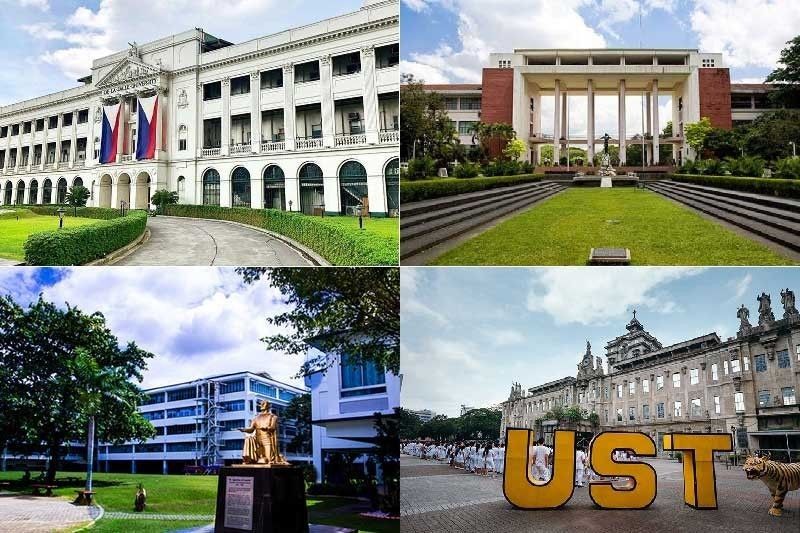Employer preference for grads of 'Big 4' schools outdated — career educator

MANILA, Philippines — Year after year, an increasing number of Filipino high school students compete for limited slots in the country’s most selective colleges and universities.
Universities part of the "Big 4," especially, draw hundreds of thousands of hopeful applicants who bank on their grades, test-taking skills and luck to get into the school they believe will lead to guaranteed success.
But school prestige – whether actual or perceived – has long been a topic of debate on whether it still holds some measure of influence over employers’ hiring decisions.
Is academic and employment success truly a guarantee for all graduates of the University of the Philippines Diliman, Ateneo de Manila University, De La Salle University Manila and the University of Santo Tomas?
Should high school graduates prioritize these schools when weighing their options for college?
For answers to these questions, Philstar.com spoke to Junn Geronimo of GuidanceNGO – an advocacy organization dedicated to educating students on careers by keeping track of all the latest degree program accreditations and board exam results in the Philippines.
No 'Big 4' monopoly on areas of study
Geronimo said that the concept of the Big 4 is becoming increasingly outdated, particularly in industries where these schools do not consistently produce the best graduates.
“The Big 4 does not have a monopoly on all industries. For instance, none of them offers a degree program in aeronautical engineering, or marine transportation,” Geronimo said.
A useful barometer, Geronimo said, is to look at schools with a consistently high passing rate in professions with a licensure exam.
For instance, UP Diliman may not be considered the best school for those interested in pursuing a master’s degree in guidance and counseling, Geronimo said in an interview with Philstar.com.
Based on the latest results of the licensure examination for guidance counselors, for example, UP Diliman only ranked 26th among 49 schools with an overall board passing rate of 61.02%, according to GuidanceNGO’s tracker.
Ateneo de Naga University, meanwhile, ranked first with a passing rate of 97.30%.
“So that is something everyone should understand. What do these schools excel in? What career can’t you pursue in certain schools?” Geronimo said.
Geronimo acknowledged, however, that the Big 4 schools continue to be well-known in the Philippines and internationally for a reason: their strong track record in producing outstanding graduates, academic excellence and a stringent and competitive admissions process, among others.
“So (studying in a Big 4 school) still matters. But there are also graduates of other universities who can be just as or more skilled,” he added.
Networking
Another overlooked advantage that graduates of the country’s top universities typically have over other students is the pre-employment preparation they receive from their schools, Geronimo added.
“You will see that graduates of the Big 4 schools have an edge. That’s because their schools give them pre-employment preparation. Naturally, these schools conform to standards, and they have programs teaching students how to answer in interviews, how to present themselves,” Geronimo added.
“But we still have many graduates from other universities who also get some form of career preparation,” he said.
“So that’s one thing students have to remember: before you graduate, are you prepared by your institution for employment? That’s why we need those programs. Even a placement office. Because these colleges and universities, especially the ‘Big 4,’ are well connected already,” Geronimo said.
Big 4 alumni can also often vouch for the quality of instruction and real-world exposure in their degree programs, boosting the chances of their schoolmates’ applications, whether intentionally or unintentionally, Geronimo said.
Employer awareness
Not all industry leaders or human resource personnel are also well-informed about the different factors that make a college or university excel in certain fields.
To determine which schools are excellent in certain fields, Geronimo shared with Philstar.com what he considers the “ABCs” of colleges and universities:
- Accreditation - The accreditation level status of college programs is granted by four accrediting agencies, the most well-known of which is the PAASCU (Philippine Accrediting Association of Colleges and Universities). These accreditations are typically awarded to programs that meet a set of academic standards.
- Board exam results – According to Geronimo, it’s the consistency of the passing rate year after year, and not the number of top notchers, that dictate the overall competency of a school’s graduates in a field.
- Center of Excellence or Center of Development by the Commission on Higher Education – These are citations given to higher education institutions for programs that meet the evaluation criteria of the CHED. The Center of Excellence is “a department within a higher education institution, which continuously demonstrates excellent performance in the areas of instruction, research and publication, extension and linkages, and institutional qualifications” while a Center of Development “refers to a department within a higher education institution, which demonstrates the potential to become a Center of Excellence in the future.”
"Employers need to be aware of accreditations. (They need to) overhaul the traditional thinking and prejudice for Big 4 schools," Geronimo said.
"Equip yourself with criteria to determine who among your pool of talents can really deliver. School prestige should not be the sole basis," he added.
- Latest
- Trending






























